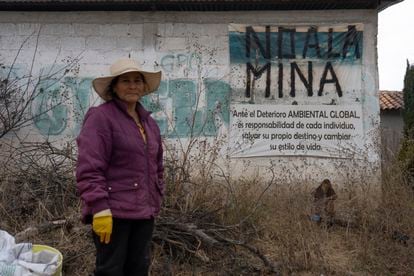Elvia García, resident of a town near Tecoltemi.Monica Gonzalez
Tecoltemi's territory is no longer part of a mining concession.
Seven years after this rural community in the State of Puebla began the legal battle, the Supreme Court of Justice of Mexico has agreed with him this Wednesday by invalidating the authorizations given by the Government without prior consultation.
This is the first time that the highest court has ruled out a concession under this argument, according to the lawyers consulted.
However, the ministers have refused to declare four articles of the Mining Law unconstitutional, as the ejido claimed.
The first chamber of the Supreme Court has left the concessions "insubstantial", as proposed in the draft sentence of Minister Jorge Mario Pardo Rebolledo.
The court confirms that a prior consultation should have been carried out in Tecoltemi as it is an indigenous community, as mandated by the Constitution and Convention 169 of the International Labor Organization signed by Mexico.
The Government granted two concessions to the Canadian Almaden Minerals in 2003 and 2009, which together amounted to 14,229 hectares, without asking the affected communities.
Tecoltemi, with just 300 inhabitants, found out in 2015 after submitting a request for information.
The company's project consisted of opening an open pit mine to extract gold and silver.
Driven by the fear of running out of water for the crop fields, the town presented an amparo that for almost seven years has been escalating judicial instances until reaching the highest court.
The General Directorate of Mines, dependent on the Ministry of Economy, and the mining company had argued that the consultation should only be carried out once the exploitation program is known, not before the issuance of titles.
These arguments were rejected in the draft judgment supported by the Chamber.
“Even when they point out, it is until the affectation materializes that the obligation of indigenous consultation arises, this is contrary to the international norms and precedents themselves,” the project read.
Even so, the decision does not close the door so that the permits can be granted again.
The draft ruling ordered the Ministry of Economy to “issue them again considering that (...) there is a conventional obligation for all Mexican authorities to carry out the necessary mechanisms or procedures that make effective the right to prior, free and prior consultation”. informed”.
On the other hand, the ministers leave the Mining Law intact.
Tecoltemi had claimed the unconstitutionality of four articles of the legislation, among them, the one that establishes that this activity is "preferential over any other use of the land" on the grounds that it opened the door to violations of the rights of indigenous peoples.
Before the decision, Itzel Silva, one of the community's lawyers, from the NGO Fundar, pointed out that the highest court was facing a historic opportunity.
“The Mining Law is the origin of the violations,” she pointed out.
In the project, on the other hand, Pardo Rebolledo rejected the unconstitutionality of the Law. The minister affirmed that the Constitution recognizes "the exclusive power of the Federation to apply the modalities that are necessary for the use of mineral resources" and that the rights of indigenous peoples “are subject to certain limits and restrictions”.
In any case, the decision of the Supreme Court sets a precedent.
The highest court had already pointed out the need to carry out prior consultations in indigenous communities, but it is the first time that a mining concession has been canceled for that reason, according to the jurists.
"It is a precedent that consolidates an interpretation of the Court according to which the right to consultation exists and has constitutional status," says lawyer Alejandro Marreros, from UNAM.
Last year, the Court dealt with a similar amparo filed by the Maseual indigenous people, also in Puebla, which denounced the lack of consultation in a mining concession.
Although the ministers then affirmed the right to prior consultation, it was decided to return the case to the collegiate court, a lower step, to decide on the legality of the permits.
The resolution is still pending.
Marreros points out that these decisions are part of a long legal battle between the communities.
“15 years ago, the courts did not even recognize the rights of indigenous peoples or that Convention 169 was part of the Constitution.
It is from the defense of the communities that the regulatory framework is being modified, but it takes a long time.
There is a structural inequality to access justice”.
The government had pressured the Supreme Court to declare the four articles unconstitutional, considering them "discriminatory."
The Ministry of the Environment and other federal agencies have issued two statements in a month.
Despite this critical stance, the Morena parliamentary majority that supports the government has not promoted changes to the legislation in three and a half years.
Some of its most prominent members are linked to the mining sector, including senators Napoleón Gómez Urrutia, general secretary of the National Mining Workers' Union, and Armando Guadiana, a coal businessman.
subscribe here
to the
newsletter
of EL PAÍS México and receive all the informative keys of the current affairs of this country

